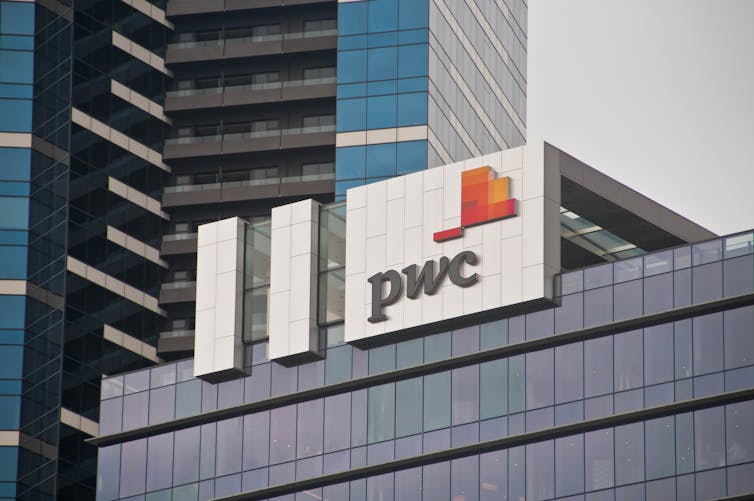PwC scandal shows consultants, like church officials, are best kept out of state affairs.

Australia’s Treasurer Jim Chalmers called it “an appalling breach of trust”. But the scandal involving the local arm of PricewaterhouseCoopers (PwC), the world’s second-largest professional services firm, is much worse than that.
PwC Australia’s chief executive Tom Seymour and two other board members, Pete Calleja and Sean Gregory, last week finally resigned their leadership positions over the use of confidential information about Australian tax policy to help PwC clients avoid paying tax.
In January, it was revealed the Tax Practitioners Board had (in late 2022) terminated the registration of PwC Australia’s former head of international tax, Peter-John Collins, for sharing information he gained at confidential Treasury consultations. Collins left PwC last October.
In March, the Senate announced an inquiry into the integrity of consulting services. Seymour downplayed the leak as a “perception issue”.
Things only substantially changed after the inquiry this month published internal PwC emails showing that (in the words of the Australian Financial Review) “for years, dozens of PwC operatives used confidential updates on government tax plans obtained by Collins to drum up new tax clients”.
Up to eight partners shared the information about plans to tackle multinational tax avoidance. As many as 40 of PwC’s 900 partners received emails discussing using the information. This included Seymour. (For context, PwC Australia has about 900 partners and 8,000 staff.)
It wasn’t until the emails were made public that Seymour announced an “independent” review of the firm’s governance, culture and accountability (to be done by former Telstra chief executive Ziggy Switkowski), with the partners who received the emails being put through PwC’s “consequence management framework”.
Values in conflict
PwC made at least A$2.5 million from the leaked information, using it to drum up new business for the company’s tax services. In terms of PwC Australia’s total revenues of $2.6 billion last year, it’s not much. But the fact it happened, and the response of PwC’s leadership since, is telling.
The whole fiasco stands in stark contrast to PwC’s stated corporate values that “celebrate doing the right thing”.
The firm describes itself as “purpose-led and values-driven”. In 2019 its global chairman, Bob Moritz, was among 181 business leaders who signed a declaration redefining the purpose of the corporation as being about delivering value to all stakeholders.
These are warm sentiments, but the proof is in the pudding, and a key social responsibility of any business is to pay taxes that fund schools, roads, hospitals and protection of the vulnerable. It’s hard to reconcile the statements about values with the apparent laxity around the Collins case.
 PwC has about 8,000 staff in Australia, and another 320,000 globally. Shutterstock
PwC has about 8,000 staff in Australia, and another 320,000 globally. Shutterstock
Bigger than one company
The fundamental conflict that underlies the scandal is what makes it bigger than just PwC.
In any area where governments make decisions affecting business profitability, there are incentives for vested interests to influence the process. There are, however, few areas where the government has so blatantly left its processes open to abuse as through its reliance on external consultants.
Federal spending on consultancy-related contracts rose from $352 million to $888 million a year between 2012–13 and 2021–22, according to the Australian National Audit Office says. PwC’s share over the decade was more than $420 million.
Reversing this trend, and separating corporate and public interests, is now as crucial as separating church and state.
The high priests of consulting
As the coronation of King Charles reminds us, the separation of church of and state is unfinished business in the political institutions inherited from Britain. Nonetheless, since the Enlightenment it has been broadly accepted that keeping church and state broadly distinct is necessary for good democracy.
One of the reasons the church got powerful in the first place is that for hundreds of years it was the only institution more or less based on meritocracy. It was a source of advisers who could read, write and add up numbers – useful skills for any monarch.
Clerical advisers such as Alcuin of York in the court of Charlemagne, or Cardinal Richelieu, the chief minister to King Louis XIII, were a bit like modern corporate consultants.
They belonged to a multinational organisation with a vast global network. Secular leaders looked to them as the experts on many matters. The lack of separation, however, between their allegiances came with significant downsides, both for religious freedom and state political independence.
The power of the modern consultants to influence government is akin to the influence Church officials once wielded. The danger of particular private interests taking precedence over public ones is striking, as the tax scandal illustrates.
Much more needs to be done
The PcW scandal raises serious doubt about the value that consultants are making to government efforts to stamp out tax avoidance by multinational companies, with estimated US$1 trillion of profits per year funnelled through tax havens globally. The cost to Australian taxpayers (through lost revenue from Australian companies using tax havens) is estimated to be about A$6 billion a year (US$5 billion).
Seymour has announced he will retire later in the year. More retirement announcements are expected. The federal government is considering how to impose a financial penalty on the firm.
But these are are minor punishments that will leave the systemic problem untouched. Much more needs to be done to prevent the system of democratic government being abused for private gain.![]()
Carl Rhodes, Professor of Organization Studies, University of Technology Sydney
This article is republished from The Conversation under a Creative Commons license. Read the original article.

